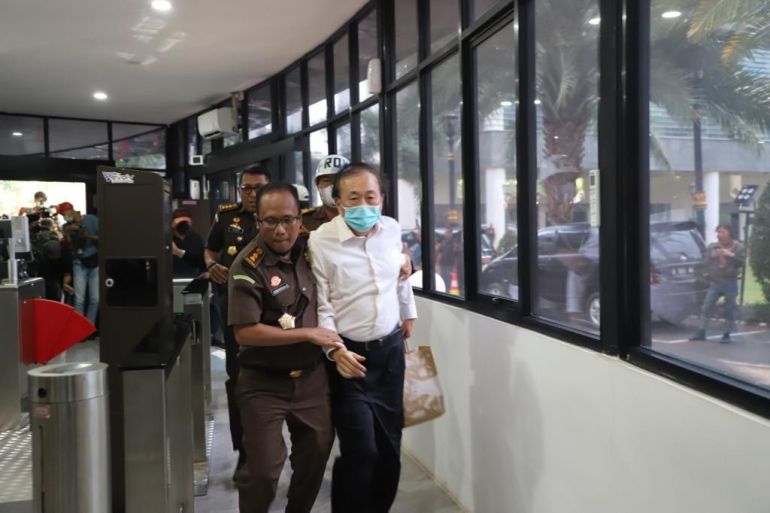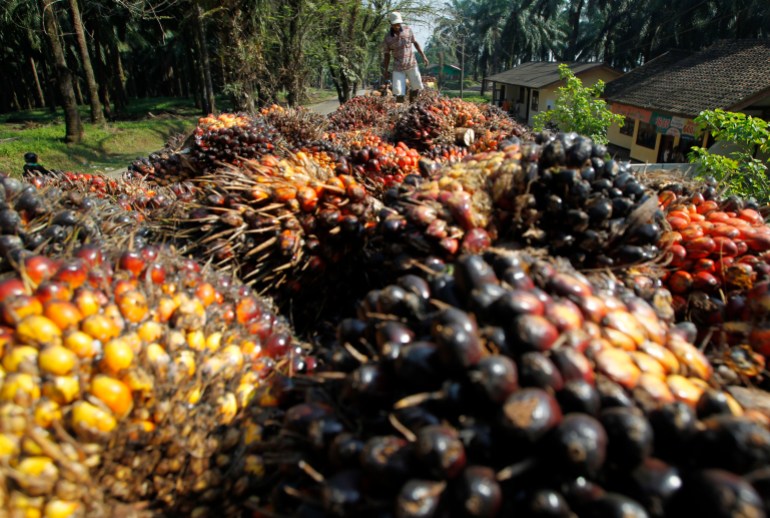Indonesia’s palm oil tycoon Darmadi gets 15 years for corruption
Surya Darmadi ordered to repay the state equivalent of $2.6bn over corruption scheme that cleared protected forests.

Medan, Indonesia – Surya Darmadi, one of Indonesia’s biggest palm oil tycoons, has been sentenced to 15 years in prison and ordered to repay the state the equivalent of $2.6bn for his role in a corruption scheme that caused the deforestation of thousands of hectares of protected land in Sumatra.
Darmadi was charged with bribing several Indonesian officials in Riau Province — a major centre for palm oil production — to allow him to convert more than 36,420 hectares (90,000 acres) of forest into oil palm estates under subsidiaries of his company, PT Duta Palma.
Keep reading
list of 4 itemsNigerian presidential hopeful Peter Obi vows to fight corruption
Vietnam President Phuc resigns amid ministers’ corruption scandal
Ukraine’s Zelenskyy renews war on corruption amid scandals
Investigators who delved into the company’s finances before the trial alleged that the estates earned PT Duta Palma about $40m per month, and accused Darmadi of committing money laundering and tax evasion from 2002 onwards.
Palm oil, used in countless products from food and cosmetics to biofuel, is a highly lucrative business and Indonesia is the world’s largest producer and exporter of palm oil products. Indonesia exported in excess of 30 million tonnes of palm oil products in 2022, generating more than $39bn in revenue, according to the Indonesian Palm Oil Association.
Riko Kurniawan, the director of Paradigma, a Sumatra-based nongovernmental organisation focused on social justice and environmental issues, said Darmadi’s sentencing was a watershed as palm oil companies typically escaped legal action due to widespread corruption that has allowed them to bribe officials.
“Darmadi’s case is exceptional because we rarely see those in the palm oil industry held to account,” Kurniawan told Al Jazeera. “This is truly unprecedented.”
“This time, the prosecution was very clever in putting together a case with different layers of charges including corruption and money laundering so that Darmadi would face the full force of the law,” he added.

The prosecution in the case had accused Darmadi of inflicting state losses of 73 trillion Indonesian rupiahs ($4.8bn) through his corruption — making him the perpetrator of the biggest corruption scheme in Indonesia’s history.
However, the panel of judges led by Judge Fahzal Hendri cited Darmadi’s age and ongoing heart problems as reasons not to hand the 71-year-old a life term as requested, arguing that the 15-year sentence should not be viewed as lacking substance.
“Corruption is an extraordinary crime, and we need to set an example for others,” Hendri said. “That said, there are humanitarian factors here. There are no tricks, just humanitarian reasons for the sentence.”
Finding Darmadi guilty of corruption and money laundering, Judge Hendri ordered the tycoon to repay 2.2 trillion rupiahs ($144m) that he previously owed the government and a further 39 trillion rupiahs ($2.5bn) in state losses.
Indonesia is home to the third-largest area of tropical forests in the world and up to 15 percent of all known plants, mammals and birds on the planet, according to Greenpeace.
In a 2021 report, Greenpeace Indonesia said that oil palm plantations had been the “largest single cause of deforestation in Indonesia over the last two decades”.
Global Forest Watch found that Indonesia lost 230,000 hectares (568,300 acres) of its primary forest in 2021.
Darmadi was first named as a suspect in 2014 when Indonesia’s Corruption Eradication Commission accused him of having bribed the former governor of Riau Province, Annas Maamun, with a $200,000 payment to amend forestry regulations to make it easier for PT Duta Palma to operate.
In 2022, he was again named as a suspect over alleged payments to the former head of Indragiri Hulu District in Riau Province, Raja Thamsir Rachman, who issued operating permits for five of PT Duta Palma’s subsidiary companies.
Darmadi fled Indonesia in 2014 and evaded authorities’ attempts to extradite him until he returned to the country of his own accord last year, resulting in his arrest.
In 2018, Forbes put Darmadi’s net worth at 20 trillion rupiahs ($1.3bn).
In addition to the 15-year prison term and restitution order, Darmadi was fined $65,000 by the court. If he is unable to pay the requested $2.6bn within a month of final sentencing, it will be replaced with an additional five years of prison time, the court ruled.
“We will appeal, we will appeal, your Honour. Thank you, your Honour, for giving [me] 15 years,” Darmadi said following the sentencing.